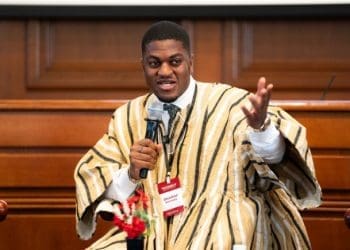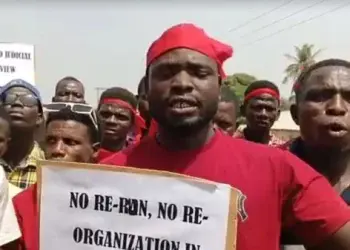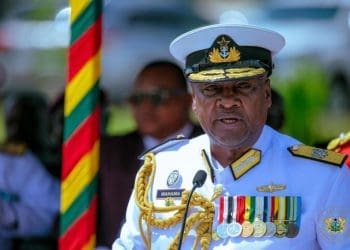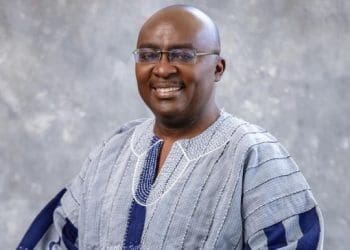Former President Nana Addo Dankwa Akufo-Addo has cautioned African nations against adopting generic governance models, stressing that the continent’s deep-rooted challenges require context-specific solutions, bold leadership, and robust institutions.
Delivering the graduation lecture to Course 33 of the Nigerian National Defence College (NDC) in Abuja on Monday, August 18, 2025, Akufo-Addo spoke on the theme “Strengthening Institutions for Good Governance in Africa”.
His address was both a sober reflection on Africa’s progress and a prescription for the future, blending lessons from Ghana’s democratic journey with wider continental reforms.

Institutions, not strongmen
Akufo-Addo began by reaffirming a principle he has long championed: Africa’s destiny will be shaped not by personalities but by strong, independent, and resilient institutions.
He declared, “Africa’s future will not be built by chance. It will be built by strong institutions and bold leadership.”
While acknowledging that Africa has made significant progress since the democratic wave of the 1990s, he stressed that corruption, insecurity, weak accountability, and state fragility remain major stumbling blocks.
He pointed to the 2024 Mo Ibrahim Index of African Governance, which highlighted a “deepening security crisis and shrinking participatory environment,” as evidence that much remains to be done.
He rejected the idea that Africa could adopt uniform, externally driven fixes. “Our challenges cannot be resolved by a one-size-fits-all solution,” he warned.
“What works in Botswana or Rwanda may not automatically work in Nigeria, Ghana, or Mali. Each country must fashion reforms that reflect its history, culture, and aspirations.”
Ghana as a case study
Akufo-Addo held up Ghana’s governance experience as proof that African countries can craft homegrown reforms that deliver results.
He traced Ghana’s democratic resilience to the adoption of the 1992 Constitution, which entrenched multiparty democracy and credible elections.
“I stand here as a beneficiary of those reforms,” he noted, referencing his own rise to the presidency after a peaceful transition of power.
He praised Ghana’s Electoral Commission for its independence and credibility, saying its work had won global admiration.

Beyond electoral reforms, he highlighted education as another pillar of Ghana’s progress. He cited his administration’s Free Senior High School policy, which expanded access to secondary education and helped raise Ghana’s adult literacy rate from 64 per cent in 2016 to 84 per cent in 2024.
Education, he argued, is not just a social good but a governance tool: it produces informed citizens who can participate meaningfully in democracy.
He also referenced Ghana’s creation of the College of Defence Studies, later chartered as the National Defence University, as part of efforts to professionalise the armed forces and reduce dependence on foreign training institutions.
Prescriptions for Africa’s governance deficit
In a wide-ranging lecture, Akufo-Addo laid out a multi-layered strategy to tackle Africa’s governance challenges.
His prescriptions touched on politics, economics, technology, and security.
Financial self-reliance
He stressed that African nations must reduce donor dependence by mobilising domestic revenue.
“The most pressing need for good governance is for our nations to raise their own funds to finance development,” he said. Without financial independence, he argued, African states remain vulnerable to external pressures that can undermine sovereignty and accountability.
Independent anti-corruption bodies
Akufo-Addo called for laws granting anti-corruption institutions genuine operational and financial independence.
He cited Botswana and Rwanda as examples where empowered anti-corruption agencies had made tangible progress.

He warned that without independence, such institutions risk becoming “toothless watchdogs” vulnerable to political interference.
Technology for transparency
The former president underscored the role of technology in closing corruption loopholes.
He suggested that open contracting portals, e-procurement systems, and even blockchain technology could enhance transparency in public financial management. ‘
He explained that digital reforms not only expose fraud but also build trust with citizens and investors.
Judicial independence and economic growth
Linking governance to economics, Akufo-Addo emphasised that an independent judiciary capable of enforcing contracts and protecting property rights is essential for attracting investment. “When businesses trust the courts, they invest with confidence. That confidence fuels growth, creates jobs, and reduces poverty,” he said.
Professional and neutral military
Akufo-Addo gave special attention to the military’s role in governance.
He argued that coups thrive where soldiers lack fair pay, constitutional loyalty, and professional standards.
“A stable democracy depends on a military that is professional, politically neutral, and backed by a transparent civilian administration,” he said.
He urged the graduating officers to see themselves not only as fighters but as “guardians of peace and defenders of the constitution.”
Diagnosing the deficits
Akufo-Addo did not shy away from naming Africa’s biggest deficits.
He cited youth unemployment, which he described as a “time bomb” threatening stability.
The former President also mentioned brain drain, particularly of health professionals, which weakens systems already under strain.
He also identified opaque institutions inherited from colonial rule, which often prioritise rulers over citizens.
Akufo-Addo also pointed to limited political accountability, as evidenced by shrinking civic space and attacks on media freedom.
He argued that these challenges stem from historical legacies but are perpetuated by present-day governance failures.
“We cannot continue to blame colonialism forever,” he said pointedly. “Our generation must take responsibility for building accountable states that serve our people.”
Africa’s place in the global economy
Beyond governance, Akufo-Addo addressed the economic dimension of institutional reform.
He spotlighted the African Continental Free Trade Area (AfCFTA), headquartered in Accra, as a transformative opportunity for Africa. Currently, intra-African trade is estimated at only 16 per cent of GDP, compared to 75 per cent in the European Union.

He urged Ghana and Nigeria’s private sectors to lead AfCFTA implementation. “As the two largest economies in West Africa, we cannot afford to let this window of opportunity slip,” he said.
A more integrated market, he explained, would stimulate innovation, improve food security, and unlock youth employment by unleashing Africa’s entrepreneurial spirit.
Akufo-Addo also stressed that strong institutions are critical to AfCFTA’s success.
“Contracts must be enforced, property rights must be protected, and disputes must be resolved fairly. Without strong institutions, AfCFTA will remain an aspiration, not a reality,” he said.
The role of the military
Given his audience, Akufo-Addo placed significant emphasis on the military’s role in sustaining democracy.
He recounted his decision in 2023 to commission Ghana’s College of Defence Studies, and its subsequent chartering as an autonomous Defence University in 2024, as part of his vision for a modern, professional force.
He warned that instability often arises when militaries become politicized or underpaid.
“Coups become less likely when soldiers are loyal to the constitution, institutions are strong, and the economy provides jobs and services for all,” he said.
In a message tailored to the graduates, he reminded them: “Your uniform is not just for battle. It is a badge of honour, a promise to your country, and a symbol of integrity. Carry it with courage and humility.”
Education as the foundation
Returning to education, Akufo-Addo argued that the future of African governance hinges on how well countries invest in human capital.
He credited Ghana’s Free SHS policy with boosting civic awareness and informed participation.
“Education is the surest path to building citizens who demand accountability and participate actively in nation-building,” he said.
He urged African leaders to see education not just as a social service but as a governance reform tool.
Higher literacy, he argued, translates into stronger democracies.
A vision for African governance
In his concluding remarks, Akufo-Addo called for what he described as “self-defined, all-encompassing governance owned by Africans.”
He insisted that reforms must be context-driven, inclusive, and anchored in the realities of each nation.
He reminded the graduates that good governance is “perhaps the single most important factor in eradicating poverty and promoting development.”
He challenged them to embody integrity in their service, warning that Africa’s future rests on the courage and humility of its leaders—military and civilian alike.
“With political will, citizen engagement, and investment in education, Africa’s young and dynamic population can transform our governance deficit into a future of opportunity and prosperity,” he said.
Nana Akufo-Addo’s address at the Nigerian National Defence College was at once a reflection of Africa’s achievements, a critique of its shortcomings, and a roadmap for the future.
He wove together lessons from Ghana’s reforms, prescriptions for Africa’s governance gap, and a passionate appeal to the next generation of leaders to uphold integrity and defend constitutional order.
By rejecting one-size-fits-all approaches and insisting on context-driven reforms, he made clear that Africa’s solutions must come from within.
His message to Nigeria’s defence graduates—and to Africa at large—was unmistakable: the continent’s stability, prosperity, and dignity rest not on external prescriptions but on the courage to build strong, independent, and accountable institutions.












